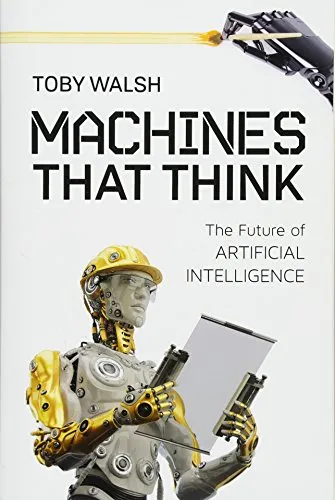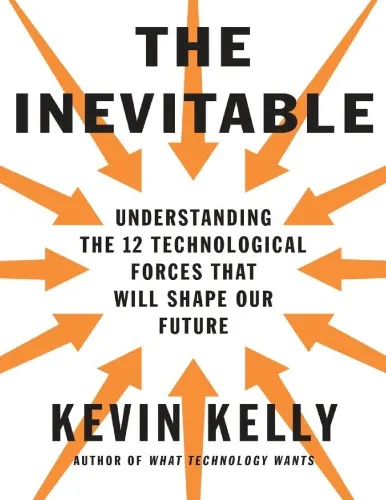Machines who think : a personal inquiry into the history and prospects of artificial intelligence
4.5
بر اساس نظر کاربران

شما میتونید سوالاتتون در باره کتاب رو از هوش مصنوعیش بعد از ورود بپرسید
هر دانلود یا پرسش از هوش مصنوعی 2 امتیاز لازم دارد، برای بدست آوردن امتیاز رایگان، به صفحه ی راهنمای امتیازات سر بزنید و یک سری کار ارزشمند انجام بدینکتاب های مرتبط:
معرفی کتاب
کتاب "Machines who think : a personal inquiry into the history and prospects of artificial intelligence" اثر پاملا مککورداک، یک نگاه جامع و شخصی به تاریخچه و آینده هوش مصنوعی ارائه میدهد. این کتاب به بررسی عمیق مفاهیمی مانند توانایی ماشینها در تفکر، تاریخچهای از توسعه هوش مصنوعی و چشماندازهای آینده آن میپردازد.
خلاصهای از کتاب
نگاه دقیق مککورداک به فرآیندهایی که منجر به شکلگیری زمینه هوش مصنوعی شدهاند، نشان میدهد که چگونه ایدهها و فلسفههای مختلف به توسعه این علم مدرن کمک کردهاند. این کتاب نه تنها بر روی پیشرفتهای علمی و فنی تمرکز دارد، بلکه به جنبههای اجتماعی و اخلاقی هوش مصنوعی نیز میپردازد. با پوشش جزئیاتی از مراحل اولیه توسعه هوش مصنوعی تا تحقیقات پیشرفتهتر امروزی، خواننده با سیر تحولات این زمینه آشنا میشود.
نکات کلیدی کتاب
- بررسی تاریخچه دقیق هوش مصنوعی و تلاقی آن با علوم دیگر.
- تحلیل تغییرات اجتماعی و فلسفی ناشی از ورود AI به عرصههای مختلف.
- نگاه به آینده هوش مصنوعی و پیشبینیهای مربوط به آن.
جملات معروف از کتاب
"AI is not just a technological shift but a profound transformation of society, reshaping the way we think and interact."
"Machines that think will challenge our very understanding of intelligence and what it means to be human."
چرا این کتاب مهم است؟
اهمیت کتاب "Machines who think" در این است که به خوانندگان کمک میکند دیدگاه گستردهتری نسبت به هوش مصنوعی و تاثیرات احتمالی آن بر دنیای مدرن داشته باشند. این کتاب به گونهای طراحی شده که نه تنها متخصصان حوزه فناوری، بلکه علاقهمندان عادی نیز بتوانند از محتوای آن بهرهمند شوند. بررسی متون تاریخی، مصاحبهها و تحلیلهای مککورداک، کتاب را به یکی از منابع معتبر در زمینه هوش مصنوعی تبدیل کرده است.
Welcome to an exploration of the fascinating world of artificial intelligence through my book, Machines Who Think: A Personal Inquiry into the History and Prospects of Artificial Intelligence. This book delves into the captivating history, ongoing developments, and future possibilities of AI, offering readers a comprehensive understanding of this rapidly advancing field. Originally published in 1979, with subsequent updates to reflect the evolving landscape, it remains a seminal work for anyone curious about how minds can be modeled, and machines designed to think.
Detailed Summary of the Book
The book provides a historical perspective on artificial intelligence, charting its development from ancient mythologies about artificial beings to contemporary advancements that challenge our imagination. It discusses key pioneers in the field, such as Alan Turing and John McCarthy, highlighting their contributions and the fundamental ideas they introduced. Through interviews and rigorous research, I explore how AI has evolved from theoretical concepts to tangible technologies that permeate our daily lives.
The narrative is interwoven with personal reflections and anecdotes, offering insights into the cultural and philosophical implications of creating machines that can think. From chess-playing computers to autonomous vehicles, the journey of AI is one fraught with technical hurdles, ethical dilemmas, and boundless curiosity about the nature of intelligence itself.
Key Takeaways
- AI has a rich history that intersects with various scientific, cultural, and philosophical domains.
- The development of AI has been both iterative and revolutionary, punctuated by periods of intense innovation and setback, commonly referred to as "AI winters".
- Understanding the history of AI helps contextualize current debates on its ethical, legal, and societal impacts.
- The potential of AI is as vast as it is complex, promising significant advancements in productivity, healthcare, and human-computer interaction, while also posing profound challenges.
Famous Quotes from the Book
"Artificial intelligence began with an ancient wish to forge the gods."
"As machines advance in capability, so do our speculations about the nature of intelligence and consciousness."
Why This Book Matters
This book is significant because it poses enduring questions about the nature of intelligence and the boundaries between human minds and artificial constructs. It offers a comprehensive look at AI's technological and ethical dimensions, contributing to a deeper understanding of what it means for machines to "think". The dialogues and narratives presented in the book remain relevant as society increasingly relies on AI technologies and navigates the complications they introduce.
Furthermore, it serves as a crucial resource for those studying the history and ethics of technology, interested in the sociocultural narratives that underpin scientific advancement. Through thoughtful inquiry and historical insight, Machines Who Think encourages readers to ponder not just the capabilities of AI, but its implications on our identity, autonomy, and future.
دانلود رایگان مستقیم
شما میتونید سوالاتتون در باره کتاب رو از هوش مصنوعیش بعد از ورود بپرسید
دسترسی به کتابها از طریق پلتفرمهای قانونی و کتابخانههای عمومی نه تنها از حقوق نویسندگان و ناشران حمایت میکند، بلکه به پایداری فرهنگ کتابخوانی نیز کمک میرساند. پیش از دانلود، لحظهای به بررسی این گزینهها فکر کنید.
این کتاب رو در پلتفرم های دیگه ببینید
WorldCat به شما کمک میکنه تا کتاب ها رو در کتابخانه های سراسر دنیا پیدا کنید
امتیازها، نظرات تخصصی و صحبت ها درباره کتاب را در Goodreads ببینید
کتابهای کمیاب یا دست دوم را در AbeBooks پیدا کنید و بخرید
